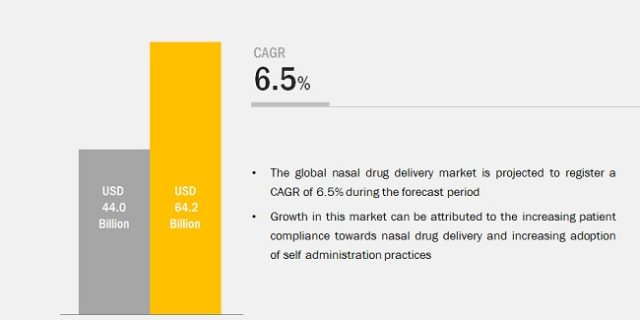
Increasing patient preference for nasal drug delivery as a result of easy administration & better efficacy and growing adoption of self-administration practices are some of the major factors driving the growth of the nasal drug delivery technology market. Intranasal drug delivery is one of the most preferred drug delivery routes among patients as well as healthcare providers. This can be majorly attributed to the non-invasive nature of this route of delivery and the fact that drug absorbability is higher through the nasal route.
The global nasal drug delivery technology market is projected to reach USD 64.20 billion by 2021 from USD 44.00 billion in 2016, at a CAGR of 6.5% during the forecast period.
Increasing patient preference for nasal drug delivery as a result of easy administration and better efficacy
Intranasal drug delivery is one of the most preferred drug delivery routes among patients as well as healthcare providers. This can majorly be attributed to the non-invasive nature of this route of delivery and the fact that drug absorbability is higher through the nasal route. In addition, the nasal route offers a less hostile environment as compared to the gastro-intestinal route; this enables better absorption of drugs. Moreover, nasal drug delivery, unlike some other routes of drug delivery, dose not require any sterile method for administering drugs into the body. The easy administration of these drugs plays a crucial role in improving the compliance to drug therapies among patients, which in turn drives patient outcomes. Considering these factors, the preference for nasal drug delivery is increasing among patients as well as healthcare providers.
Download PDF Brochure: https://www.marketsandmarkets.com/pdfdownloadNew.asp?id=192818058
Furthermore, growth among over-the-counter nasal drugs and increasing focus on alternative routes of drug delivery such as nasal drug delivery offer significant growth opportunities for player operating in the market. On the other hand, complications associated with the overuse of nasal sprays may restraint the growth of the nasal drug delivery technology market.
The overuse of nasal sprays results in various complications, such as irritation in the nasal mucosa, dryness within the nose, temporary burning sensation, and runny nose. This is because nasal sprays comprise a chemical that is used for shrinking blood vessels in the nose. Thus, the continuous use of these sprays may render the blood vessels to be less responsive to the medication. Also, overuse of nasal sprays usually causes addiction among patients, which may lead to serious long-term conditions such as chronic sinusitis.
According to the U.S. Department of Health & Human Services, in 2014, there were 29.4 million adults diagnosed with sinusitis in the U.S.; this represented 12.3% of thetotal population in the country. In the nasal route of drug delivery, doctors and physicians usually cannot control the dosage of medicine consumed by patients. This can result in decongested nose and other chronic problems. These drawbacks are expected to limit the growth of the nasal drug delivery technology market (specifically for nasal sprays).
Request for Sample Pages:
https://www.marketsandmarkets.com/requestsampleNew.asp?id=192818058
Prominent players in the nasal drug delivery technology market include Merck & Co., Inc. (U.S.), Novartis AG (Switzerland), Johnson & Johnson Services, Inc. (U.S.), Pfizer, Inc. (U.S.), AstraZeneca plc. (U.S.), AptarGroup (U.S.), and GlaxoSmithKline plc (U.K.).

